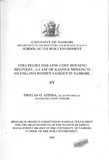| dc.description.abstract | This Research Project is an appraisal of the initiatives of Community Based Organizations (CBOs) in Kenya. Low-income groups in Kenya lack resources with which to improve their shelter, infrastructural services, community facilities and also for starting small-scale enterprises. The conventional lending institutions impose very stringent lending criteria, which exclude the low-income groups. Given the fact that the Kenyan government has considerably reduced its involvement in housing production, the low-income households have identified Community Based Organisations as one of the ways of realising improved housing and living conditions.
The study analyses the contributions Community Based Organizations have made in availing minimum standard housing to the low-income groups, in tandem with the functional aspects relating to housing such as employment, services, facilities, small-scale enterprises, tenure, social cohesion, etc. Using Kayole Mihang’o Muungano Women’s Group as a case study, the study discusses the major initiatives of the group under study, achievements, areas which need further improvement and problems affecting their initiatives in housing development for low-income households. The study also offers recommendations on how the initiatives of the Community Based Organisations can be enhanced.
In order to clearly demonstrate the effects of the group’s initiatives on housing and related services, the study compared the provision of the same in the previous settlements of Soweto and Mihang’o, where all the beneficiaries of the housing scheme at Kayole came from, with the developments in the new settlement at Kayole.
The study begins with the evaluation of the social economic characteristics of the group under study, and finds out that, Kayole Mihang’o Muungano Women’s Group is made up of young people with the average age being 34 years. Most of the members are married, although a reasonable percentage is single. The number of people who are married with children or not married but have children, and therefore need more rooms, is high. The level of education which has an influence on both employment and income is generally low. The study as a result established that the members of the group under study are low-income households.
The study then assessed the provision of infrastructure, community facilities and availability of loans for small-scale enterprises, and established that, the Community Development Funds have made remarkable contributions towards this end, save for the facilities which require initial high capital investments and maintenance operations, which is beyond the means of the low-income groups. | en |

